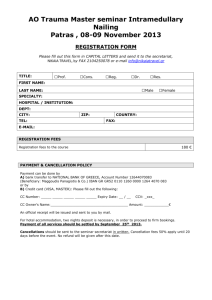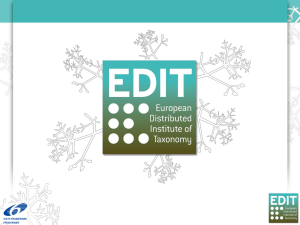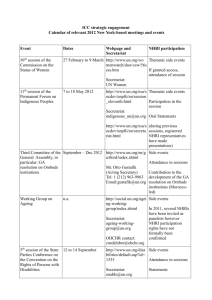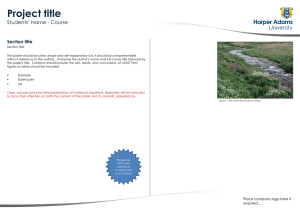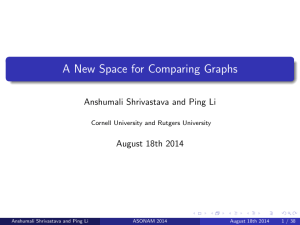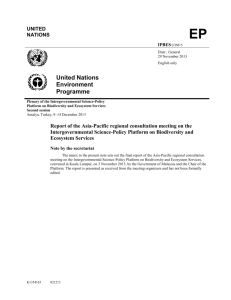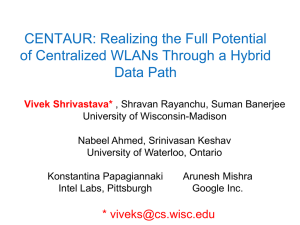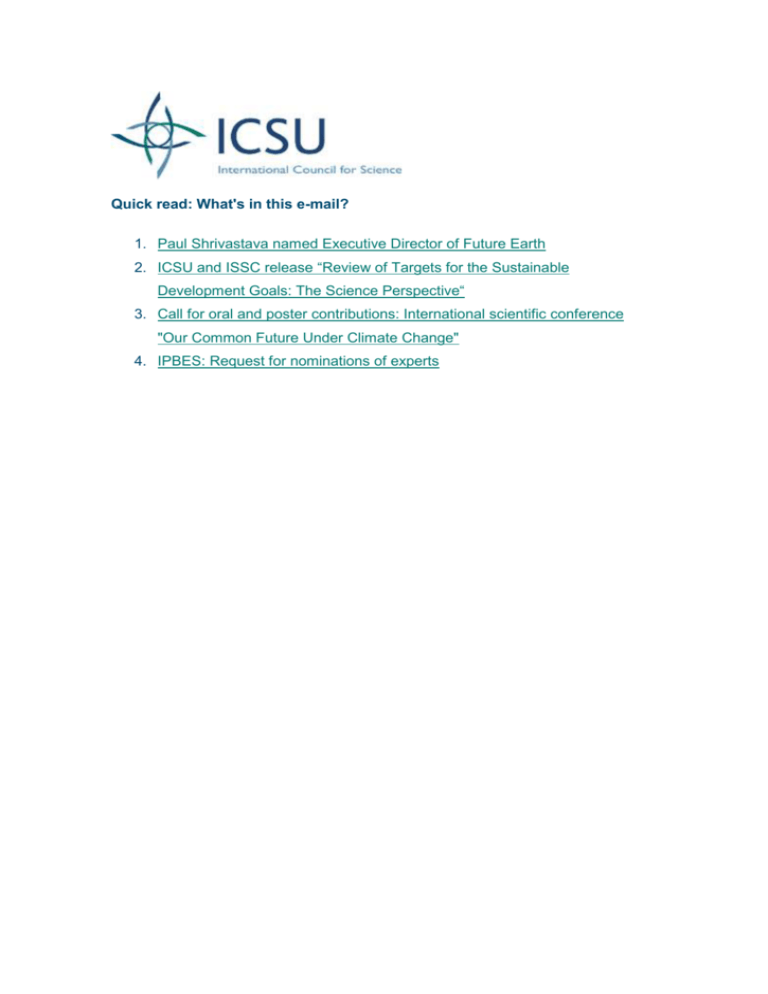
Quick read: What's in this e-mail?
1. Paul Shrivastava named Executive Director of Future Earth
2. ICSU and ISSC release “Review of Targets for the Sustainable
Development Goals: The Science Perspective“
3. Call for oral and poster contributions: International scientific conference
"Our Common Future Under Climate Change"
4. IPBES: Request for nominations of experts
Paul Shrivastava named Executive Director of Future Earth
Paris, February 13th 2015 — The International Council for Science (ICSU), on
behalf of the Science & Technology Alliance for Global Sustainability,
announced today the appointment of Paul Shrivastava as Executive Director
of Future Earth.
Currently he is the David O’Brien
Distinguished Professor of Sustainable
Enterprise, and the Director of the David
O’Brien Centre for Sustainable Enterprise, at
the John Molson School of Business,
Concordia University in Montreal, Canada.
Shrivastava has more than three decades of
experience in management education,
entrepreneurship, and working as a consultant to major multi-national corporations.
Shrivastava, a US citizen, was born in India and works in Canada and France. He
will take up his post in early February 2015, based at the Montreal Global Hub of
the Future Earth Secretariat. He will lead a globally distributed secretariat
composed of five global hubs functioning as a single entity, located in Montreal,
Paris, Tokyo, Stockholm and Boulder, Colorado. The global hubs will be
complemented by a set of regional hubs for the Middle East and North Africa, Latin
America, Europe, Asia and Africa.
The Prime Minister of Quebec, Philippe Couillard, will hold a press conference later
today in Montreal (9:30 am EST) to announce Shrivastava’s appointment. Gordon
McBean, President of the International Council for Science, and co-chair of the
Science & Technology Alliance for Global Sustainability, will be present.
Shrivastava will work with Frans Berkhout, Interim Director of Future Earth, to
ensure a smooth handover of functions from the Interim Secretariat based at ICSU
in Paris to the new globally-distributed Executive Secretariat. Reporting to the
Governing Council of Future Earth, the Executive Director will work closely with an
Executive Team formed of the five Global Hub Directors, as well as the Chairs of
the Science and Engagement Committees. Recruitment of the hub directors is
currently underway.
Flavia Schlegel, co-chair of the Alliance and Assistant Director-General for Natural
Sciences at UNESCO, said, “We are very pleased to announce the appointment of
Shrivastava, whose unique background and skillset at the intersection of
academia, business and management makes him the perfect choice to achieve the
step-change in ambition that Future Earth requires.”
“I am honoured by this appointment to lead the Future Earth Executive
Secretariat. Future Earth is an organisation of thousands of volunteer scientists
working in hundreds of locations around the world. The secretariat will strive to be
the glue that holds the organisation together, by facilitating and coordinating its
activities, communicating with stakeholders, enabling research, building capacity,
and synthesising foresights. I look forward to joining the Future Earth team of
professionals and highest calibre scientists to develop co-designed and
stakeholder engaged sustainability sciences,” Shrivastava said.
Shrivastava received his PhD in Strategic Planning and Policy from the University
of Pittsburgh. He was tenured Associate Professor of Management at NYU Stern
School of Business, Howard I. Scott Professor of Management at Bucknell
University, and helped establish the International Research Chair in Art and
Sustainable Enterprise at ICN Business School in Nancy, France. He was part of
the management team that launched one of India’s largest computer companies,
Hindustan Computers Ltd, and founded a non-profit organisation to mediate the
crisis between Union Carbide Corporation and the Indian government during the
Bhopal crisis in the 1980s. He has published 18 books and over 100 papers in
academic and professional journals.
The Future Earth blog has an interview with the new Executive Director.
ICSU and ISSC release “Review of Targets for the Sustainable Development
Goals: The Science Perspective“
The International Council for Science, in partnership with the International
Social Science Council, released a new report today which provides an
independent review of the 169 targets under the proposed Sustainable
Development Goals (SDGs), which are set to be approved at the General
Assembly of the UN in September.
Bringing together the work of over 40 leading
researchers from across the natural and
social sciences, the report is being released
ahead of a major meeting at the UN in New
York from 17-20 February where negotiators
in the Open Working Group will discuss an
over-arching declaration for the proposed
framework, a “goal of the goals”.
The authors find that the SDGs offer a "major
improvement" over their predecessors, the
Millennium Development Goals (MDGs).
However, of the 169 targets beneath the 17
draft goals, just 29% are well defined and
based on the latest scientific evidence, while 54% need more work and 17% are
weak or non-essential.
Many of the targets suffer from a lack of integration, some repetition and rely too
much on vague, qualitative language rather than hard, measurable, time-bound,
quantitative targets, the report finds.
Authors are also concerned the goals are presented in ‘silos.’ The goals address
challenges such as climate, food security and health in isolation from one another.
Without interlinking there is a danger of conflict between different goals, most
notably trade-offs between overcoming poverty and moving towards sustainability.
Action to meet one target could have unintended consequences on others if they
are pursued separately.
Finally, the report highlights the need for an ‘end-goal’ to provide a big picture
vision for the SDGs. “The ‘ultimate end’ of the SDGs in combination is not clear,
nor is how the proposed goals and targets would contribute to achieve that ultimate
end,” write the authors. They recommend that this meta-goal be “a prosperous,
high quality of life that is equitably shared and sustained.”
Download the full report (PDF) and the accompanying supplement “Sustainable
Development Goals and Targets” (PDF) which lists all 17 goals and 169 targets. A
blog post on Road to Paris explains the core findings, and includes several
interviews with the researchers who wrote the assessment. The report was also
covered in Science: "Sustainable goals from U.N. under fire". (paywall)
Call for Oral and Poster Contributions: International Scientific Conference "Our
Common Future Under Climate Change"
The international scientific conference “Our Common Future under Climate
Change” will take place at UNESCO in Paris in July 2015.
This four-day conference will be the largest forum for the scientific community to
come together ahead of the 21st UNFCCC Conference of the Parties (COP21),
which will be hosted by France in December 2015. Building on the results of IPCC
5th Assessment Report (AR5), the conference will address key issues concerning
climate change in the broader context of global change. It will offer an opportunity
to discuss solutions for both mitigation and adaptation issues.
A call for contributions (oral and poster) is being held by the conveners of parallel
sessions in close collaboration with the conference's scientific committee.
Proposed contributions must be relevant to one of the themes for parallel sessions.
Once the call for contributions has closed, selected oral contributions may be
included in the parallel sessions hosted by conveners or may be recommended as
a poster contribution as part of the conference’s poster sessions.
For more details on how to propose a contribution, see the conference website.
IPBES: Call for nominations of experts
The Intergovernmental Platform on Biodiversity and Ecosystem Services
(IPBES) has put out a request for nomination of experts for a set of regional
and sub-regional assessments of biodiversity and ecosystem services, a
thematic assessment of land degradation and restoration, and the scoping of
a global assessment of biodiversity and ecosystem services.
They are in need of a broad variety of experts from various natural and social
scientific disciplines and from indigenous and local knowledge systems, as well as
policy and technical experts and practitioners.
Interested experts (nominees) are requested to fill out their application form no
later than 31 March 2015. Nominators (governments or organisations) should
submit approved applications by 5 April 2015 at the latest. Earlier nominations are
encouraged.
For full details on the call and the application forms, see this page on the IPBES
website.
Follow the International Council for Science on social media:
Facebook Twitter
Website
Copyright © 2015 International Council for Science, All rights reserved.
You are receiving this email because you signed up for the ICSU Newsletter in the past through our website or
at an ICSU-sponsored event.
Our mailing address is:
International Council for Science
5 rue Auguste Vacquerie
Paris 75116
France
Add us to your address book
unsubscribe from this list
update subscription preferences



